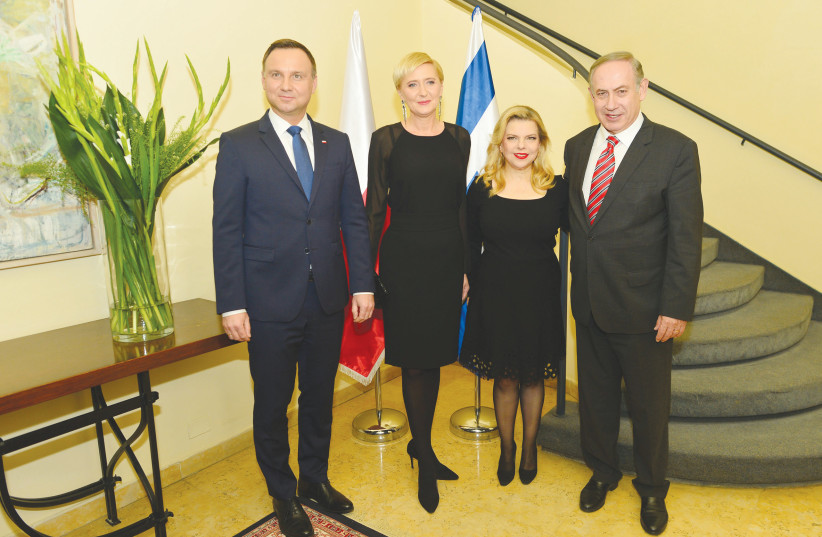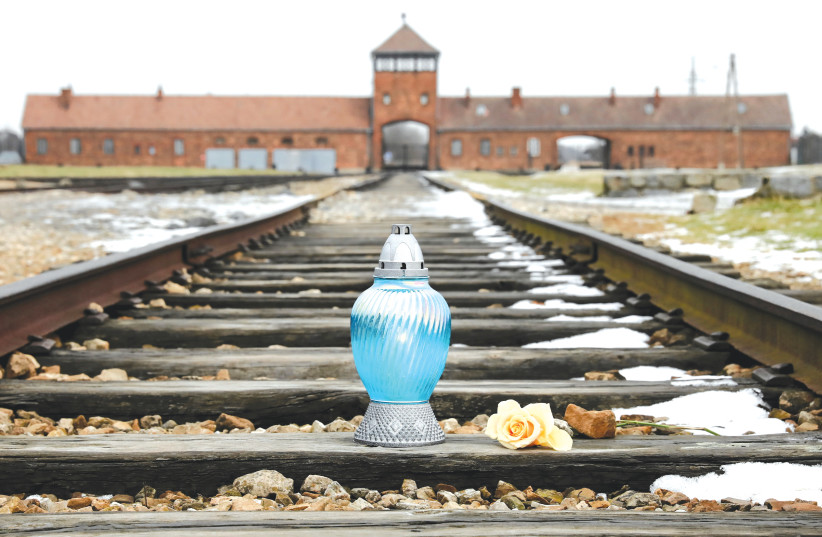 Israel-Poland deal and the distortion of Holocaust history – opinion
Israel-Poland deal and the distortion of Holocaust history – opinion
DANIEL SCHATZ
The memory of the Shoah must be preserved with accuracy and honesty and the recent Polish-Israeli agreement should be scrutinized for its potential to distort history.
.

The recent agreement between Israel and Poland to resume Israeli school trips to Poland has ignited significant controversy and concern among prominent historians and the wider Jewish community. Critics argue that the agreement dangerously misrepresents the memory of the Shoah, compromising historical truth and accuracy.
The agreement advises Israeli youth delegations to visit sites in Poland related to other crimes of World War II, including those documenting crimes committed by Nazi Germany against non-Jewish Poles, as well as sites commemorating Poles who participated in the murder of Jews. Joint Polish and Israeli tour guides will accompany the youth on these visits.
Distinguished historians, such as Professors Havi Dreifuss and Jan Grabowski, have criticized the inclusion of certain sites in the agreement’s appendix, including the Markowa Ulma Family Museum of Poles Who Saved Jews in World War II and the Museum of the Cursed Soldiers in Ostrołeka, which commemorates Jozef Kuras, a partisan fighter hailed as a national hero who murdered Jews.
They, along with Israel’s opposition leader Yair Lapid – whose father survived the Holocaust – have called the agreement a capitulation to Polish propaganda and a dream come true for Holocaust deniers.
“We note with satisfaction that the Israeli side referred to our point of view with understanding and has adopted the Polish position.”Zbigniew Rau
Polish Foreign Minister Zbigniew Rau praised the agreement, stating, “We note with satisfaction that the Israeli side referred to our point of view with understanding and has adopted the Polish position.” Deputy Foreign Minister Pawel Jablonski added that Israeli students will also meet with Polish youth to combat negative stereotypes that exist in Israel regarding Poland.

YAD VASHEM, Israel’s official Holocaust memorial, rightly denounced the deal, insisting that such trips must maintain complete historical accuracy, including the role of Poles in the persecution, betrayal and murder of Jews during the Holocaust.
This is not the first time Netanyahu has faced accusations of facilitating the distortion of the role of Poles in the mass murder of Jews in exchange for political support from Warsaw. In 2018, a joint statement between the Polish and Israeli prime ministers on the Holocaust sparked similar outrage from Yad Vashem and leading researchers for containing grave errors and deceptions.
While the systematic and industrial genocide was initiated, implemented and enforced by the German Reich, the reactions to the recent Polish-Israel agreement stem from the fact that many Poles were witnesses to and in some cases participants in the Nazi German extermination campaign.
Poland’s history of Holocaust revisionism and Israeli capitulation
Historian Jan Gross concluded in a 2015 article that Poles killed more Jews than Nazis during the occupation. Such revelations were shockingly at odds with the self-image of Poles as heroic, glorious and innocent people who, risking their own lives, did everything in their power to save their fellow countrymen.
Despite these facts, Poland’s Law and Justice (PiS) party, in power since 2015, has sought to downplay the role of Poles in the persecution of their Jewish neighbors while highlighting instances where Poles saved Jews. In 2016, then-education minister Anna Zalewska sparked controversy by claiming the Jedwabne pogrom that was perpetrated by the local villagers rather than their German occupiers as a matter of opinion. In 2018, Article 55A was passed, criminalizing public accusations of Poland’s participation in or responsibility for Nazi or communist crimes.
Holocaust denial is easy to identify and straightforward to explain; more subtly and insidiously, some governments now continue engaging in distorting the facts of their history for contemporary political purposes. While acknowledging that genocide took place, distorters strive to absolve their own nations and people of any involvement, attributing all responsibility to their Nazi occupiers.
The argument that a victim cannot be a victimizer disregards the historical reality of the widespread collaboration and bystanderism of local populations, as well as the presence of domestic antisemitism, which provided an integral component of the Holocaust’s machinery and persists to this day.
When a positive and idealized past is not available, it must – in the words of the Holocaust scholar Yehuda Bauer – be created out of a mixture of truths, half-truths and the wish for history to have happened the way it is presented. Government-run institutions, museums, schools, media outlets and monuments honoring nationalist figures have all been bent toward these aims. Partial truth becomes total distortion, which includes thought control in the service of nationalistic regimes dismantling fundamental democratic rights and freedoms, as well as the rule of law.
THE CURRENT Polish-Israeli agreement holds significance for the PiS government, as it enables them to leverage their nation’s historical experiences of foreign invasion, occupation and subjugation to present themselves as steadfast defenders of Poland’s sovereignty, values, culture and faith. This strategy has resulted in the discrediting of political opponents, including those who critically examine Poland’s World War II history, by branding them as unpatriotic or enemies of the country.
Such tactics foster a siege mentality, particularly among the government’s core supporters, in which Poland must once again defend itself from external enemies and traitors within – a mindset the party uses to distract attention from the erosion of democratic norms and institutions.
Five years ago, on International Holocaust Remembrance Day, then-economy minister Eli Cohen, who negotiated the current agreement on behalf of Netanyahu, tweeted, “No law can erase the horrors of the Holocaust and Poland’s involvement in the atrocities.” Now, as foreign minister, it appears that Cohen is willing to compromise historical memory for political and diplomatic gains.
Some Jewish groups have supported this narrative, with Sebastian Rejak, director of the American Jewish Committee in Central Europe, hailing the agreement as a step in the right direction that will give a full picture of the Holocaust on Polish state-run television.
As we commemorate Yom Hashoah today and the 80th anniversary of the Warsaw Ghetto Uprising tomorrow, it is crucial that we honor the memory of those who fought and suffered by combating all forms of Holocaust denial and distortion. This includes highlighting instances where local populations participated in the persecution, betrayal and murder of Jews during the Holocaust, as well as in acts of rescue.
Simcha Rotem, the last living fighter of the Warsaw Ghetto, conveyed these sentiments in a public letter to Polish President Andrzej Duda before his death. “As someone who fought side by side with my Jewish sisters and brothers in the streets of the Warsaw Ghetto against the Nazi Germans, I want to say that many sons of the Polish nation took an active role in the extermination of the Polish Jews during the Holocaust,” Rotem wrote.
“They took part in deporting the Jews from their homes, they acted with brutality and after the liberation, they took part in murdering those who survived the Nazi killing machine and who only wanted to return to their homes… Only once Polish society truly faces the bitter historical truth, revealing its scope and severity, will there be a chance that those horrors will not be repeated,” he concluded.
President Isaac Herzog, who will attend the commemoration in Poland and meet with Duda, would do well in echoing Rotem’s words to ensure that historical facts and truths are not lost to political expediency.
The President should remind his hosts about the inconvenient truth that contrary to the state-sanctioned narrative of Poles selflessly, bravely and constantly assisting Jews during the German occupation, the Jews of Warsaw in 1943 perished in isolation, largely forgotten and, with few exceptions, forsaken by their fellow citizens. On the Aryan, Polish side of the city, life continued as people focused on the upcoming Easter festivities – with the uprising inconveniently commencing with the Christian holy week.
CZESLAW MILOSZ, the Nobel Prize-winning Polish poet who lived in Warsaw during the occupation, observed the burning ghetto from the other side of the wall. In his evocative and moving poem “Campo dei Fiori,” he reflected on the behavior of his fellow Poles:
“At times wind from the burning
would drift dark kites along
and riders on the carousel
caught petals in midair.
That same hot wind
blew open the skirts of the girls
and the crowds were laughing
on that beautiful Warsaw Sunday.”
The memory of the Shoah must be preserved with accuracy and honesty and the recent Polish-Israeli agreement should be scrutinized for its potential to distort history. What is forgotten in the midst of all these controversies is the simple fact that close to three million Polish Jews who found themselves under German occupation perished. This ancient culture was almost entirely wiped out together with 98% of its members, leaving behind a legacy of loss and destruction.
The words of Milosz and Rotem are stark reminders of the need to uphold the truth and not allow political expediency to erase the suffering of millions of Holocaust victims. This solemn responsibility is not only owed to the past but also to future generations to ensure that such atrocities never happen again.
It is regrettable that 80 years after the annihilation of Polish Jewry, governments still need to be reminded of these facts.
The writer is a visiting scholar at Georgetown University’s School of Foreign Service and a writer on international affairs. He has served as a visiting fellow at Harvard University, Stanford University and Columbia University.
Zawartość publikowanych artykułów i materiałów nie reprezentuje poglądów ani opinii Reunion’68,
ani też webmastera Blogu Reunion’68, chyba ze jest to wyraźnie zaznaczone.
Twoje uwagi, linki, własne artykuły lub wiadomości prześlij na adres:
webmaster@reunion68.com
